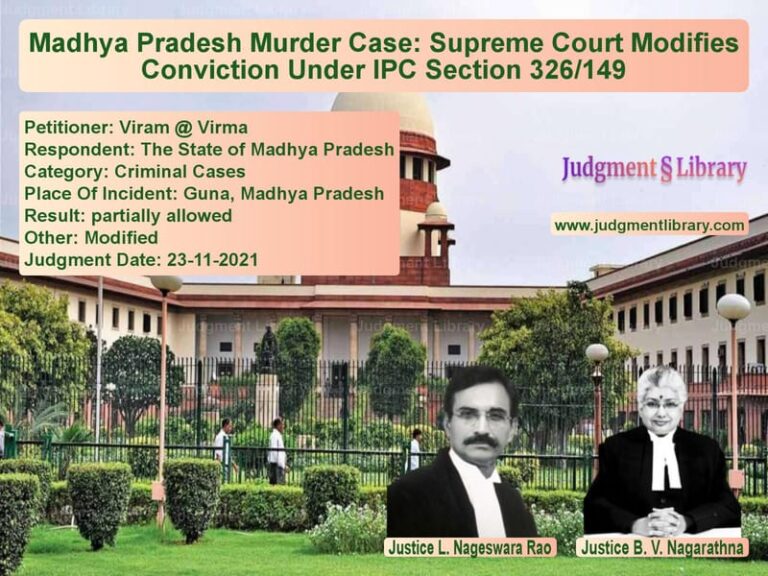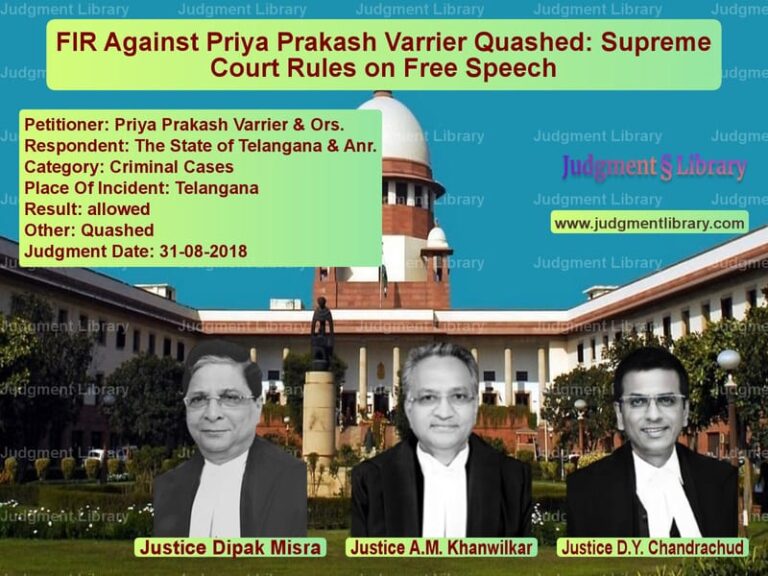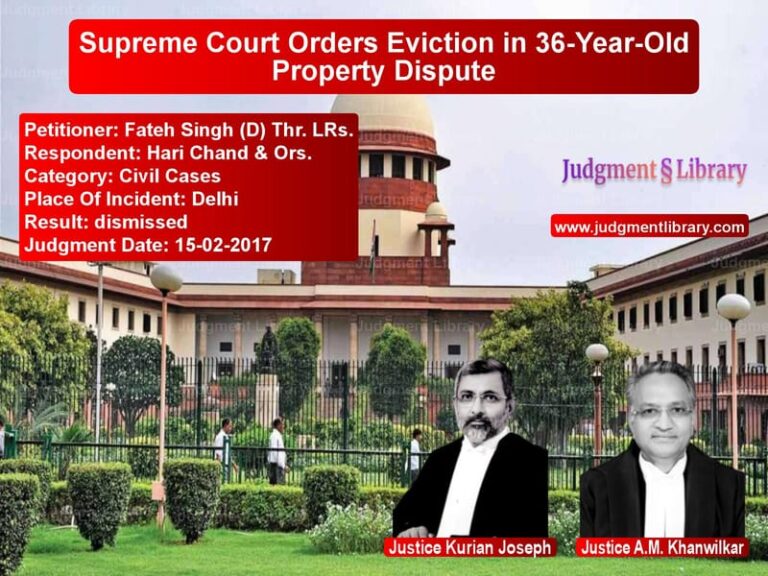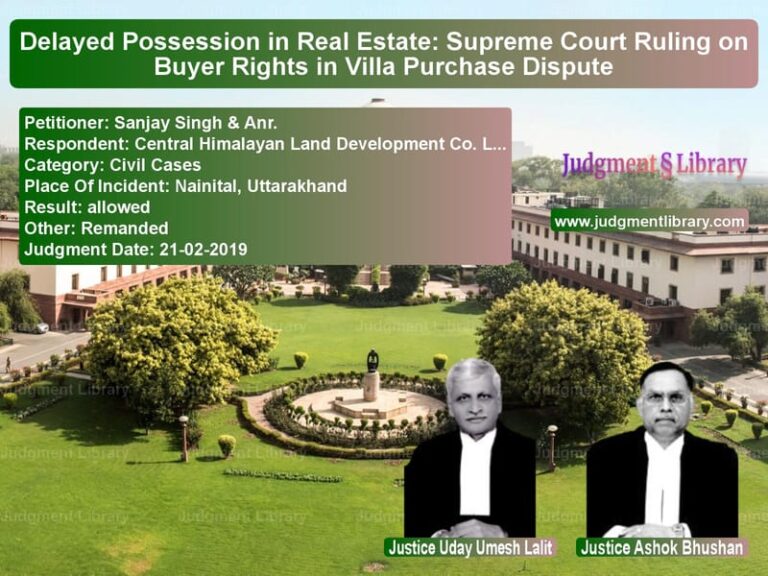Port Trust’s Right to Evict and Dispose Goods: Supreme Court Ruling on Public Premises Act
The Supreme Court of India recently ruled on an important legal issue concerning the rights of the Board of Trustees for the Port of Kolkata in relation to unauthorized occupants on public premises. The case centered around the interpretation of Section 6 of the Public Premises (Eviction of Unauthorised Occupants) Act, 1971 (PP Act), and whether the Port Trust could seize and dispose of goods belonging to third parties that were found on the public premises after an eviction order.
Background of the Case
The case originated from a dispute concerning a piece of land measuring 17,238.15 square meters at Transport Depot Road, Kolkata. This land was originally allotted to M/s. Shalimar Tar Products Ltd. (STPL) under a lease agreement. However, STPL stopped paying rent in 1973, and its lease expired in 1981. Despite repeated notices, STPL failed to vacate the premises, leading the Board of Trustees for the Port of Kolkata (Port Trust) to initiate eviction proceedings under the PP Act.
The Estate Officer issued an eviction order against STPL on 09.07.2007, directing them to pay damages amounting to Rs. 2,46,64,411. After failing to comply, the Port Trust took possession of the premises on 08.03.2008. However, several containers belonging to third parties remained on the premises, leading the Port Trust to issue a notice under Section 6 of the PP Act for the disposal of these goods.
Legal Issues and Arguments
Arguments by the Port Trust
- The Port Trust had the authority under the PP Act to evict unauthorized occupants and dispose of any goods left on the premises.
- The goods found on the premises, whether belonging to STPL or third parties, could be sold to recover arrears of rent and damages.
- There was no need to establish privity of contract between the Port Trust and the owners of the goods, as the PP Act provided for the disposal of property found on public premises.
Arguments by the Respondents
- The containers in question did not belong to STPL but to third parties who had no contractual relationship with the Port Trust.
- The Port Trust could not claim a lien over goods belonging to third parties for rent due from STPL.
- Their right to remove the goods should not be restricted merely because they were present on public premises at the time of eviction.
High Court’s Findings
The case was initially heard by the Calcutta High Court, which referred the matter to a Full Bench to determine the scope of the Port Trust’s powers under the PP Act. The Full Bench ruled that Sections 59 and 61 of the Major Port Trusts Act, 1963 (MPT Act), could not be applied to proceedings under the PP Act. The High Court held that the Port Trust had no general lien over third-party goods and could not detain or sell them.
Supreme Court’s Observations and Ruling
The Supreme Court examined the provisions of the PP Act and the MPT Act in detail. The Court made the following key observations:
- “Section 6 of the PP Act provides for the disposal of property left on public premises by unauthorized occupants. It does not distinguish between goods belonging to the evicted tenant and those belonging to third parties.”
- “Sub-section (1A) of Section 6 authorizes the Estate Officer to dispose of goods, materials, cattle, or other items found on the premises after giving fourteen days’ notice to their owners.”
- “The Estate Officer is empowered to recover the cost of sale and deduct any arrears of rent or damages before returning any remaining proceeds to the rightful owner.”
Based on these findings, the Supreme Court ruled that the Port Trust had the legal right to dispose of goods found on the premises, even if they belonged to third parties. The Court emphasized that Section 6 of the PP Act must be interpreted independently of the MPT Act, reinforcing the statutory authority of the Port Trust in eviction cases.
Final Verdict
The Supreme Court set aside the High Court’s ruling and upheld the Port Trust’s authority to evict unauthorized occupants and dispose of goods found on public premises. The Court directed the High Court to expedite the pending writ petition and resolve any remaining issues regarding the sale proceeds.
Conclusion
This ruling has significant implications for port authorities and other statutory bodies managing public premises. It clarifies that goods found on public premises after an eviction order can be disposed of legally, ensuring that statutory authorities can recover outstanding dues without unnecessary legal hindrances.
Petitioner Name: Board of Trustees for the Port of Kolkata & Ors..Respondent Name: APL (India) Pvt. Ltd. & Ors..Judgment By: Justice A.K. Sikri, Justice Ashok Bhushan, Justice S. Abdul Nazeer.Place Of Incident: Kolkata, West Bengal.Judgment Date: 21-02-2019.
Don’t miss out on the full details! Download the complete judgment in PDF format below and gain valuable insights instantly!
Download Judgment: Board of Trustees fo vs APL (India) Pvt. Ltd Supreme Court of India Judgment Dated 21-02-2019.pdf
Direct Downlaod Judgment: Direct downlaod this Judgment
See all petitions in Property Disputes
See all petitions in Contract Disputes
See all petitions in Landlord-Tenant Disputes
See all petitions in Judgment by A.K. Sikri
See all petitions in Judgment by Ashok Bhushan
See all petitions in Judgment by S. Abdul Nazeer
See all petitions in allowed
See all petitions in Remanded
See all petitions in supreme court of India judgments February 2019
See all petitions in 2019 judgments
See all posts in Civil Cases Category
See all allowed petitions in Civil Cases Category
See all Dismissed petitions in Civil Cases Category
See all partially allowed petitions in Civil Cases Category







